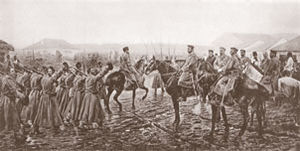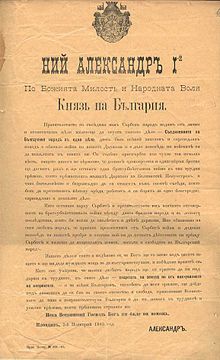Serbian-Bulgarian War
| date | 14.-28. November 1885 |
|---|---|
| place | Bulgarian-Serbian border area |
| output | Victory of the Bulgarians |
| Territorial changes | Surrender of the Tamrash areas to the Ottoman Empire |
| consequences | Status quo ante and the recognition of the Union of Bulgaria |
| Peace treaty | Peace of Bucharest (1886) |
| Parties to the conflict | |
|---|---|
| Commander | |
|
King Milan I. |
Prince Alexander I. |
| losses | |
|
746 dead and 4,570 injured |
771 dead and 4,232 injured |
The Serbian-Bulgarian War ( Bulgarian Сръбско-българска война , Serbian Српско-бугарски рат) is the term used to describe the conflict between the Kingdom of Serbia and the Principality of Bulgaria for dominance in the Balkans in 1885/1886, which also took place in the European system of power in 1885/1886 pulled.
background
The peace of San Stefano dictated by the victorious Russian Empire , which ended the Russo-Ottoman War in March 1878 , provided for the establishment of an autonomous principality of Bulgaria , which was still tributary to the Ottoman Empire and which was to be expanded to include Eastern Rumelia and Macedonia . The Berlin Congress held a few months later, however, revised these resolutions and only declared Bulgaria proper, without territorial growth, to be an autonomous and tributary principality. Eastern Rumelia remained an Ottoman province with administrative autonomy, Macedonia was completely reintegrated into the Ottoman Empire. From then on, Bulgarian foreign policy aimed to achieve final independence from the Ottoman Empire and the reintegration of Eastern Rumelia and Macedonia into its territory. Resistance was organized among the Bulgarians, who had to continue to live under foreign rule. The Kresna-Raslog uprising broke out in Macedonia as early as 1878 .
In September 1885 there was a popular officer's coup in eastern Rumelia , which was directed against Ottoman rule and proclaimed unification with the Principality of Bulgaria . A few days later, Prince Alexander I took over the rule of the autonomous Turkish province of Eastern Rumelia in place of the Governor General.
In response to the merger of Eastern Rumelia with the Principality of Bulgaria, the Russian Empire discontinued military cooperation and withdrew both military personnel and military equipment from Bulgaria. The merger was indirectly supported by Great Britain, which prevented the Ottoman Empire from intervening and thereby wanted to end its diplomatic isolation after the Berlin Congo Conference in 1884, but the Serbian King Milan I saw it as a preparation for a Bulgarian campaign on Macedonia .
On November 1st, Jul. / November 13, 1885 greg. Serbia, supported by Austria-Hungary , in whose interests the strengthening of a united Bulgaria could not be, declared Bulgaria unexpectedly war. A day later, five divisions (Morava, Šumadija, Danube, Drina, and Timok divisions) crossed the Bulgarian border. The Serbian attack sparked a great wave of outrage in Bulgaria and further cooled off relations with Russia. Without Russian military advisers and without any support from a major power, Bulgaria had to face the Serbian army. The Ottoman Empire, to which the Bulgarian principality and Eastern Rumelia were nominally subordinate, did not intervene in the war because it feared interference from the Russian Empire. At the same time, an ambassadors conference took place in Constantinople, which tried to negotiate a vote between the great powers after the unification of Bulgaria .
Fighting

Although Bulgaria had prepared for an imminent war with the Ottoman Empire and therefore concentrated a large part of its army on the Turkish border, the Serbian army had failed to win the decisive battle of Slvnitsa from November 17-19, 1885. The Bulgarian troops advancing from the southern border finally turned the war and then marched into Serbia. Another Serbian defeat followed in the Battle of Pirot , after which the Serbs capitulated. In the north, too, the Serbs did not manage to occupy the Vidin and Belogradchik region .
Only after the surrender of the Serbian army, the intervention of Austria-Hungary ended Bulgaria. In the Treaty of Bucharest on March 3, 1886, the status quo ante was restored. In the Tophane Treaty of April 5, 1886 greg. the unification of the Principality of Bulgaria with Eastern Rumelia that took place in the previous year was internationally recognized. Nevertheless, the Russian Empire continued to reject the unification of Bulgaria and the Bulgarian prince.
post war period
In the course of these events, which are also summarized under the umbrella term of the Bulgarian crisis , the Russian-Austrian relationship deteriorated to such an extent that the Three Emperor's League broke up. Although the Bulgarian Prince Alexander I was overthrown in an officer's coup initiated by Russia, the Bulgarian government of Stefan Stambolow managed to prevail against Russia. Russia subsequently initiated further military revolts (as in Burgas , Silistra , Russe ) and sent its fleet off Varna , but after the suppression of the uprisings lost its influence on Bulgaria to Great Britain and broke off diplomatic relations with the principality. Austria, on the other hand, was able to maintain its position and that of its ally Serbia and also enforce its favorite Ferdinand von Sachsen-Coburg-Gotha-Koháry as the new Bulgarian prince.
Only massive pressure from the German government prevented an armed conflict in the Balkans, into which the great powers would have been drawn. Bismarck now had to save his alliance policy with the so-called system of temporary workers. The direct consequence of the failure of the three emperors were the conclusion of the reinsurance treaty and the Mediterranean Entente .
For the Bulgarians themselves, the war led to the strengthening of the integration of the old northern and the new southern Bulgaria into a common state. A Muslim regiment of 2,000 men, a company of students studying abroad, and volunteers from Macedonia, which was still under Ottoman rule, also took part in the war.
Others
The play Heroes by George Bernard Shaw and the operetta based on it The Brave Soldier by Oscar Straus are set in this war.
Because of the better equipped and trained Serbian army , which competed against the “young” Bulgarian army , one speaks of the “war of the (Serbian) generals against the (Bulgarian) NCOs” .
Individual evidence
- ↑ Grigor Doytchinov, Christo Ganchev: Austrian Architects in Bulgaria 1878-1918. Böhlau, Vienna 2001, ISBN 3-205-99343-8 , p. 21.
literature
- Georgi Bakalov, Milen Kumanov: Elektronno izdanie - Istorija na Bǎlgarija. Trud, Sirma, Sofia 2003. (Bulgarian)
- Gerald Knaus: Bulgaria. Verlag Beck, Munich 1997, pp. 67-68.
- H. Hungerbühler: La mission militaire Suisse sur le théatre de la guerre Serbo-Bulgarians . Benda, Lausanne 1886.
Web links
- Konstantin Sybtschew: The Serbian-Bulgarian War 1885 ( Memento of March 11, 2007 in the Internet Archive ) Originally published on November 10, 2006 by the Bulgarian National Radio
- Краљ Милан и српско-бугарски рат


